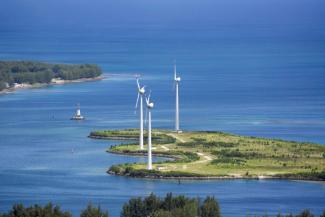2030 Agenda
G20 support for SDGs

The G20 consists of the 19 largest industrialised and emerging economies plus the European Union. It represents around two-thirds of the world population and approximately 86 % of global gross domestic product. G20 decisions are taken at the highest political level, because the heads of state and government have been representing their countries at G20 summits since 2008. Nonetheless, the G20 is an informal forum without a permanent secretariat. Its decisions are not legally binding (Berensmann et al. 2011).
As a global politico-economic coordination forum, the G20 can play a central role in the implementation of the 2030 Agenda. This applies to the Agenda’s principles (such as universality, leave no one behind, indivisibility, coordination of objectives, accountability) as well as the Agenda’s 17 Sustainable Development Goals (SDGs).
Due to its informal character, the G20 does not have a direct bearing on international organisations, but an indirect one through its member countries. Thanks to its political and economic clout, it can set important political signals (Fischer 2015). At the same time, it is committing its members to be serious about implementing the Agenda domestically. Obviously, the G20’s endorsement of the 2030 Agenda sends an important message to non-G20 countries.
In a recent Comprehensive Accountability Report, the G20 Development Working Group stated that it is tackling several aspects of the 2030 Agenda – including the SDGs and the Addis Ababa Action Agenda on financing for development. Above all, it is dealing with the issues of domestic resource mobilisation, financial inclusion and remittances as well as infrastructure investments.
Several SDGs are not covered by the Development Working Group, but by other G20 working groups. They include, for example, social protection, private-sector investments and employment, trade and Aid for Trade (G20 2016b).
The G20 Action Plan
At their summit in Hangzhou in September 2016, the G20 heads of state and government agreed on a G20 Action Plan for the 2030 Agenda, pledging to further align G20 policymaking with the Agenda. The Action Plan’s political preamble emphasises the innovative principles of the Agenda. It pledges G20 action to reach the SDGs and implement the Addis Ababa Action Agenda.
The Action Plan is geared to 15 Sustainable Development Sectors. They are not congruent with the SDGs, but based on the G20’s previous development agendas and areas of action, as were spelled out in the Seoul Development Consensus (2010), the St. Petersburg Development Outlook (2013) and the Low-Income Developing Countries Framework (2015). Nonetheless, the Sustainable Development Sectors certainly fit the G20 Agenda for strong, sustainable and balanced growth.
The new task of the G20 Development Working Group
The G20 Action Plan has the same timeframe as the 2030 Agenda. In order for the Action Plan to remain flexible, however, future G20 presidencies can adapt it to new requirements, experiences and challenges. The G20 acknowledges that the 2030 Agenda’s follow-up and review process is UN-led (G20 2016a).
The Action Plan has considerably expanded the mandate of the G20 Development Working Group. The Group now serves a dual function. On the one hand, it is still in charge of support for low-income countries. On the other, it is responsible for coordinating the implementation of the 2030 Agenda with the other G20 working groups (Berensmann 2016).
The second role is new and broadens the horizon of the Working Group. It’s mandate is no longer limited to north-south relations, but also includes south-south and north-north relations. This is in line with the SDGs.
The Action Plan is a clear indication of the G20’s support for sustainable development (Clark 2016). At the same time, it provides a normative framework for achieving the SDGs (Berger/Wolff 2016). Given the G20’s longstanding focus on conventional economic growth, it is noteworthy that the G20 takes account of sustainability in all of its three dimensions – social, economic and environmental. In the future, the G20 wants the Development Working Group to discuss progress concerning the implementation of the 2030 Agenda in its accountability reports (G20 2016a). This is an implicit commitment not only to support the 2030 Agenda, but also to facilitate public scrutiny of relevant efforts.
Moreover, the Action Plan is a contribution to building a global partnership in line with SDG 17. The G20 has stated that it will cooperate with actors beyond its membership on implementing the Action Plan. Relevant partners are the governments of low-income countries in particular, but civil society, the scientific community and the private sector matter too (G20 2016a). Since the G20 is embracing the universal approach of the 2030 Agenda, it no longer makes sense to accuse it of mere “club governance” that only serves members’ interests. The G20 has gained legitimacy. Its universal approach is a response to significant criticism regarding its institutional structure and operations.
Challenges of the G20 Action Plan
Compared with many other of G20 action plans, the Action Plan for the 2030 Agenda is imprecise. So far, neither tangible actions nor timeframes have been specified (Martens 2016). However, the G20 Development Working Group is to fill this gap by the next summit in July 2017 in cooperation with the other working groups (G20 2016a). It has been asked to draw up a comprehensive and concrete list of initiatives.
It is a huge challenge to coordinate the many G20 working groups, and so is managing the Development Working Group’s various tasks (Berensmann 2016). If the group’s different workstreams do not cooperate well, there is a risk of duplication, which would result in lower effectiveness and efficiency. Accordingly, the recent accountability report demands that the political coordination of the workstreams must improve (G20 2016b).
The G20 Action Plan for the 2030 Agenda only describes some of the relevant efforts. It must not be equated with the entire implementation effort of all members. It would fit the G20’s character if it strived for tangible change in regard to economic, fiscal and financial policy with an eye to gearing global economic governance to the 2030 Agenda.
The role of Germany
The Federal Republic of Germany will take over the G20 presidency from China in 2017. It would do well to continue the work on the Action Plan and shape G20 activities in a tangible way. The 15 Sustainable Development Sectors announced thus far offer useful reference points. Moreover, Germany’s Federal Government could illustrate that the G20 takes its commitment to the global common good seriously by organising events with various actors (civil society, the private sector, the scientific community) and with non-G20 governments.
In addition, the G20 governments could spell out concrete concepts for implementation at the national level (Kloke-Lesch 2015). Germany could assume a frontrunner role, setting an example on implementing the 2030 Agenda. It is important, in this context, to develop a common system for preparing national implementation reports concerning the 2030 Agenda.
Kathrin Berensmann is senior researcher at the German Development Institute (DIE). The author would like to thank Imme Scholz for excellent comments.
kathrin.berensmann@die-gdi.de
References
Berensmann, K., Fues, T., Volz, U., 2011: Informal power centre. In: D+C/E+Z 2011/01, p. 17.
Berensmann, K., 2016: Without the G20 no sustainable development goals. In: Diplomatisches Magazin 12/2016, Berlin.
Berger, A., Wolff, P., 2016: G20 summit in Hangzhou – what can be expected?, Bonn.
Clark, H., 2016: Implementation of the Agenda 2030.
http://www.g7g20.com/articles/helen-clark-implementation-of-the-Agenda 2030
Fischer, R., 2015: The G20 today – A development perspective. In: Chongyang Institute for Financial Studies, Renmin University of China, Global Governance and Open Economy: 2015 G20 Think Tank Summit, Conference Papers, pp. 211-218, July 30- August 1, Beijing, China.
G20 (2016a): G20 Action Plan on the Agenda 2030 for Sustainable Development, Beijing.
G20 (2016b): Comprehensive Accountability Report on G20 Development Commitments, Hangzhou.
Kloke-Lesch, A., 2015: The G20 and the Sustainable Development Goals (SDGs): Reflections on future roles and tasks, Global Governance and Open Economy: 2015 G20 Think Tank Summit, Conference Papers, pp. 263-274, July 30- August 1, Beijing, China.
Martens, J., 2016: The SDGs on the G20 Agenda. The G20 Action Plan for Agenda 2030 for sustainable development, Bonn.








